Off Duty But Not Resting
What shiftworkers do when off duty is a contentious subject. Scarlet Knight and I were leading fatigue risk management training last August with a group of controllers. One of our calendars was on the wall. The subject was off duty chores. Someone had written on the page, “Now the company is telling me what to do when I am off!”
Individuals believe that they put in their time on a shift and should be able to do whatever they want between shifts. No one is paying them for the time between shifts. Some, who have learned one needs to sleep, use the time between shifts to sleep as much as possible because they have counted the costs of sleep deprivation. Others do not rest and then are fatigued at work. Which are you?
I worked shiftwork between the ages of 26 and 40. I was one who pushed the limits and rarely used my off duty time for adequate sleep. I was stupid, and paid the consequences in health issues that have been long lasting. Fortunately, I am still alive, but that has more to do with genetics and luck than with my practices then and now. Sleep has become much more important to me at age 70. I am not as stupid now.
Some off duty activities are unavoidable. Parents with responsibilities for young children have to take care of them at all hours of the day and night. Nevertheless, one needs to get as much sleep as possible before returning to work.
Most off duty activities between shifts could be done on off days between sets of shifts. One advantage of working 12-hour shifts is that most shift rotations provide about 14 days off out of every 28. Even though some of that time needs to be used to recover from the effects of rotating shifts, there should be enough days for enjoyable, personal activities.
You are probably thinking that some activities you enjoy are scheduled at times between shifts. Ball games, family gatherings, and other events are often scheduled on weekends when the 9 to 5 Monday through Friday workers are off and you are scheduled to work. What is the harm in missing sleep in order to maintain family harmony and to enjoy a pleasurable activity? If the fatigue management training emphasizes the importance of adequate sleep, you know the harm. There is little advantage in denying the biological need for sleep.
The life of a shiftworker may seem unfair, but that is a choice one makes. I do not know the reasons you are working rotating shifts. I encourage you to think about the advantages as well as the disadvantages. As Stoic philosophy teaches, “Amor fati” or love one’s fate. I have been seeking to apply what Epictetus said, “Do not seek for things to happen the way you want them to; rather, wish that what happens happen the way it happens; then you will be happy.”
Fatigue management is a shared responsibility, and the employee has some responsibilities. There are plenty of things that happen in our lives. In a 24 hour day that includes 12 hours of work, employees need to get about eight hours of sleep. That is going to require living no more than a one-hour commute from the work location.
I empathize with the challenges of being a shiftworker, but am more concerned with the challenges of maintaining pipeline safety 24-7-365 when pipelines are being remotely controlled and monitored from your control rooms by means of SCADA systems with you in that role. While I know that everyone of you is trained and qualified, I encourage you to show up for work well rested and up to the challenge. Use your off duty time between shifts for sleep and rest. Use the fatigue countermeasures that work for you on the job. Continue to practice what you know about good sleep practices that work for you. Seek to enjoy what you do.
MANAGING FATIGUE EDUCATIONAL PROGRAM | Charles Alday © 2018 Please Distribute to Others.




